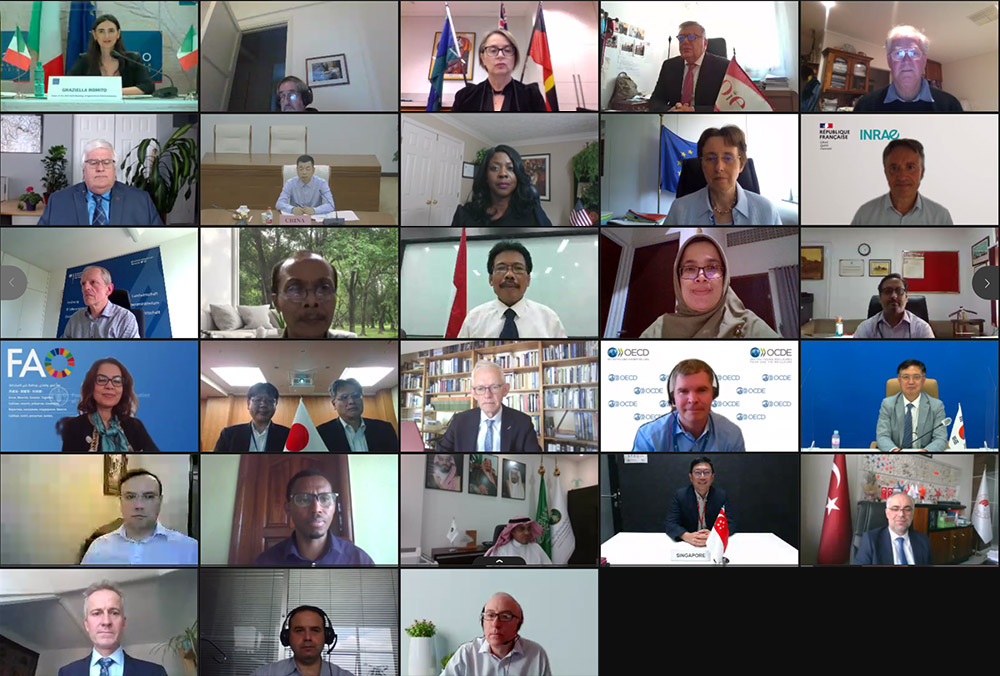Italy 2021
G20 MACS - June 15 and 16, 2021
As part of the meetings of the Italian Presidency of the G20, the Ministry of agricultural food and forestry policies organized, on June 15 and 16, 2021, in virtual format, the 10th G20 Meeting of Agricultural Chief Scientists – G20 MACS.
The meeting was coordinated by Graziella Romito, Chair of the G20 MACS, who illustrated the priority issues proposed by the Italian Presidency. At the opening, Stefania De Pascale, Vice-President of CREA (The Council for Agricultural Research and Economics) intervened. During the meeting, the G20 Delegations discussed on the concrete contribution of science to the transformation of agri-food systems towards more sustainable models, a topic introduced by Ismahane Elouafi of FAO.
Marcello Donatelli, Research Director of CREA, introduced the issue on Digital Traceability and, during the discussion, the G20 Countries explored its potential contribution to food safety. Luigi Cattivelli, Director of the Genomics and Bioinformatics Research Center of CREA and Kevin Pixley of CYMMIT presented the topic of the New Breeding Techniques applied to agriculture. Joachim von Braun illustrated the work carried out by the Scientific Group of the UNFSS while Dirk Nemitz, from the UNFCCC Secretariat, presented the preparatory activities for COP26.
The Italian Presidency, as part of the meetings of Agricultural Chief Scientists, will organize two workshops on Antimicrobial Resistance (AMR) and on Climate Change, which will take place, in virtual format, on September 1st and 2nd respectively. Delegations shared their own Countries’ experiences and best practices, and expressed the common interests to strengthen international scientific research cooperation on digital traceability and new breeding techniques. At the end of the two-day Meeting, the G20 MACS Communiqué has been adopt
Downloads
Presentations
- CREA - The Council for Agricultural Research and Economics
- FAO - The role of science, technology, and innovation in sustainable food systems to improve food security and safety
- CREA - Traceability of agricultural products digital and genetic technologies
- FAO - Digital traceability for food safety
- UNFSS - UN Food System Summit
- CREA - New breeding techniques
- Genome Editing's Potentially Fundamental Role in Food Security
Workshop
Antimicrobial Resistance (AMR)
September 1, 2021
As part of the meetings of the Italian G20 Presidency the Ministry of agricultural food and forestry policies organized, on September 1st, 2021, the G20 Workshop on Antimicrobial Resistance (AMR) to evaluate its impacts on the agricultural sector and the possible solutions.Antimicrobial resistance is an ever-increasing global threat causing an estimated 700 000 human deaths globally per year. The implementation of the One Health approach requires therefore an effort to raise awareness and incentivize the change in behaviours. Hence the importance and need for global action and a common commitment to increase investments in the animal health sector and research.These are the key messages emerged during the debate coordinated by Graziella Romito, Chair of the G20 Agricultural Chief Scientists.During the meeting, Keith Sumption of the Food and Agriculture Organization of the United Nations (FAO) and Romano Marabelli of the World Organisation for animal Health (OIE) illustrated the state of play and future perspectives; Monica Guarino Amato, of the Council for Agricultural Research and Economics (CREA) introduced a review of the most recent research approaches to mitigate the use of antimicrobials within animal production chain, while Arshnee Moodley, of CGIAR, presented the perspective of developing countries in the fight against antimicrobial resistance. The G20 Delegations discussed on the contribution of scientific research to find actions to tackle antimicrobial resistance, and address the growing threat of AMR, they shared knowledge and discussed possible future actions to overcome the problems related to antimicrobial resistance. In this context, Giovanni Loris Alborali, of the Experimental Zooprophylactic Institute of Lombardy and Emilia Romagna, illustrated the Italian strategy for tackling antimicrobial resistance in farms.
Documents
Workshop
Agriculture and Climate Change
September 2, 2021
As part of the meetings of the Italian G20 Presidency the Ministry of agricultural food and forestry policies organized, on September 2nd, 2021, the G20 Workshop on Agriculture and Climate Change.Climate change is one of the greatest challenges of our time and its adverse impacts weaken the achievement of sustainable development and threaten the resilience of the agricultural sector. For this reason, a strong political commitment and investments in research are required as well as the transfer of results to farmers so that they can find effective strategies and solutions for mitigation and adaptation to climate change. These are the key messages emerged during the debate coordinated by Graziella Romito, Chair of the G20 Agricultural Chief Scientists. During the meeting, Ismahane Elouafi of FAO e Ana Maria Loboguerrero Rodriguez, of Alliance of Bioversity International, introduced the theme of mitigation of impacts and adaptation of agriculture to climate change, while Ben Henderson, of OECD illustrated policies and strategies for agriculture to become part of the solution. Delegations shared new technologies, success stories and their own Countries' sustainable practices. In this context, Andrea Taramelli, of the IUSS, illustrated the Copernicus monitoring system and Franco Miglietta, of CNR, presented the research projects developed by Italy to contribute to mitigate climate change.
Documents
Presentations
- Climate_Change_ARG_Pablo_Mercuri.pdf
- Climate_change_FAO__Ismahane_Elouafi.pdf
- Climate_Change_GER_Osterburg_Heidecke.pdf
- Climate_Change_OECD_Ben_Henderson.pdf
- Climate_Change_UK_Cheryl_Case.pdf
- ClimateChange_CGIAR_Ana_Maria_Loboguerrero.pdf
- ClimateChange_IT_Andrea_Taramelli.pdf
- ClimateChange_IT_Franco_Miglietta.pdf
- ClimateChange_RUSSIA_Vera_Pavlova.pdf
